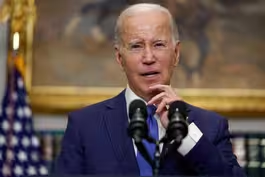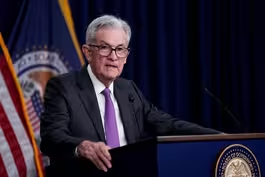
Turmoil in Israel prompts new calls for U.S. to cut off bill
Clip: 7/26/2023 | 9m 14sVideo has Closed Captions
Turmoil in Israel prompts new calls for U.S. to cut off billions in annual aid
Israel’s current political turmoil, driven by the most far-right government in that nation’s history, has renewed the debate over America’s financial assistance to that country. The U.S. has been a supporter of Israel since its creation in 1948. William Brangham discussed the calls to change that with Daniel Kurtzer and Dennis Ross.
Problems playing video? | Closed Captioning Feedback
Problems playing video? | Closed Captioning Feedback
Major corporate funding for the PBS News Hour is provided by BDO, BNSF, Consumer Cellular, American Cruise Lines, and Raymond James. Funding for the PBS NewsHour Weekend is provided by...

Turmoil in Israel prompts new calls for U.S. to cut off bill
Clip: 7/26/2023 | 9m 14sVideo has Closed Captions
Israel’s current political turmoil, driven by the most far-right government in that nation’s history, has renewed the debate over America’s financial assistance to that country. The U.S. has been a supporter of Israel since its creation in 1948. William Brangham discussed the calls to change that with Daniel Kurtzer and Dennis Ross.
Problems playing video? | Closed Captioning Feedback
How to Watch PBS News Hour
PBS News Hour is available to stream on pbs.org and the free PBS App, available on iPhone, Apple TV, Android TV, Android smartphones, Amazon Fire TV, Amazon Fire Tablet, Roku, Samsung Smart TV, and Vizio.
Providing Support for PBS.org
Learn Moreabout PBS online sponsorshipWILLIAM BRANGHAM: Israel's current political turmoil, driven by the most far right government in that nation's history, has renewed the debate over America's financial assistance to that country.
The U.S. has been a supporter of Israel since its creation in 1948 and has given it significant aid since the U.S.-brokered peace deal between Israel and Egypt in 1979.
Israel receives more U.S. aid each year than any other country, totaling $3.8 billion in military aid annually.
However, there are growing calls to revisit that.
Joining us to discuss this are Daniel Kurtzer.
He served as U.S. ambassador to Egypt during the Clinton administration and to Israel during the George W. Bush administration.
He's now a professor at Princeton University.
And Dennis Ross has also served in Democratic and Republican administrations as a Middle East peace envoy.
He's a counselor at the Washington Institute for Near East Policy.
Gentlemen, thank you both so much for being here.
Daniel Kurtzer, to you first.
You have long argued that the U.S. ought to revisit this issue of aid to Israel and to draw it down.
Why?
DANIEL KURTZER, Former U.S.
Ambassador to Israel: Well, Israel is a mature country with a mature economy.
In fact, its GDP per capita is stronger than Japan's.
And so, in fact, it really doesn't need the U.S. military assistance, number one.
Number two, this has nothing to do with the current crisis in Israel.
It's not punitive.
But it's, rather, a way to make this relationship sound and on a much better footing than it currently is.
What I have argued for is to substitute for the military assistance two agreements between our countries, one that would effectively give Israel access to American technology and America access to Israeli technology, and, secondly, to set up a joint R&D mechanism so that we can really build technology together.
That would be a far better way than this kind of dependency relationship that we have established over the years.
WILLIAM BRANGHAM: And, Daniel, just sticking with you for a moment, would you like to see that happen immediately?
DANIEL KURTZER: No, it's not realistic to think about it immediately.
We have to do this through agreements.
It would have to be phased out.
We have experienced phasing out assistance programs with Israel.
In the 1990s, we phased out our economic assistance over 10 years.
And I think it would take at least five, perhaps more years to work out the agreements that I have been calling for.
And I think, frankly, it's better for both of our countries.
The Israeli military industry will grow as a result of it.
And there won't be this shadow hanging over our relationship that somehow we can exercise pressure as a result of aid.
We don't do that anyway.
And this would remove that possibility.
WILLIAM BRANGHAM: Dennis Ross, you have heard this argument.
What do you make of this?
DENNIS ROSS, Former U.S.
Envoy to Middle East: Look, I think there's a lot of logic to what Dan is saying.
My concern would be the message it sends now.
Dan is suggesting that this isn't something that you would do now; this is something you would -- you would do through agreement, you would phase it in.
But I'm concerned that, in the current environment, it will be seen not just as a punitive step.
I think it's going to be misread by the Iranians, by Hezbollah.
They already believe that Israel is dramatically weakened because of what's going on domestically.
If it now appears that if the United States is announcing it's going to cut off military assistance to Israel or military security assistant to Israel, I think that sends a message to them that this is a time to basically increase the pressures they have on Israel.
And I would also say it sends a different kind of message to others within the region.
There are those who have heard American presidents since Ronald Reagan say, our commitment to Israeli security is ironclad.
That term has been repeated over and over again.
So if it now looks like we're saying, OK, we're going to actually cut off military assistance to Israel -- and, to be fair, that's not exactly what Dan is saying -- but many are -- many favor that.
Many will interpret calls for that this way now.
I'm afraid that you have others who doubt whether we're really reliable in the region, others who look to us for security, but have become questioning of our position in the region.
They now believe we're going to pull out of the region.
If you suddenly say a commitment that has been ironclad is now sort of one in which we're going to be reducing our military and security assistance to Israel, I suspect it tends to validate the view that we really are withdrawing from the region.
WILLIAM BRANGHAM: Daniel, what about that point, that, no matter how you frame it, that simply talking about the U.S. changing its ironclad commitment to Israel this way, that this does send a message to Israel's enemies, and that could be genuinely destabilizing?
DANIEL KURTZER: Well, actually, it's just the opposite.
I think it's a straw man argument to say that this will be misinterpreted, because it has to flow from an agreement coming from the United States and Israel.
Both of our countries need to approach this maturely and realistically.
And, in fact, there are voices in Israel today, including from the right wing and some of the right-wing press that are making the same argument.
Now, they make it for different reasons.
They want to be out from under the possibility of American pressure.
But the argument resonates in both of our countries.
So I don't think it should be taken seriously that people are going to misinterpret it.
There's strength in the U.S.-Israeli relationship in Congress.
There's strength in the U.S.-Israeli relationship in public opinion.
And that's not going to change at all.
We support Israel in the United Nations.
We support Israel in so many ways in our bilateral relationship that a bilateral set of agreements that replaces this artificial aid, I think, will actually be seen as strengthening the relationship between our two countries.
And I think that's the way it can be perceived, as long as both of us agree on this.
WILLIAM BRANGHAM: Dennis Ross, what do you see as the principal benefit of this aid?
I mean, as Daniel is saying, Israel is a wealthy country.
They are militarily very, very strong.
They don't necessarily need this money or this assistance.
So what do you see is the benefit of it?
DENNIS ROSS: Look, we have benefited a great deal from a lot of the developments that the Israelis have made because of our security assistance.
We have benefited from issues like helping to finance the Israelis on Iron Dome, a defensive missile.
We have helped by helping to finance Israel's development of the Arrow missile, also a defensive missile.
We're now helping to finance Israel's development of Iron Beam, which is a laser defensive system.
Much of the equipment we provide the Israelis that they improve on, but also much the security assistance that we provide to them, ends up benefiting us as well.
So there is a benefit to this.
I don't dispute the idea that there could be an agreement that phases out over time.
My concern is, in the current setting, in the current context, that Dan may feel that it won't be misread.
I think there are many critics of Israel who in fact are not supporters of Israel and who don't believe Israel has a right even to self-defense who would seize upon this.
And I think you have to be very careful how you present it.
You look at Iran and Hezbollah.
Hezbollah's behavior over the last several months is demonstrating they're becoming less risk-averse in a context where they read there's great turmoil and division within Israel.
And if it appears as if the U.S. is taking a step away from Israel, I think it just feeds that perception and I think it makes things a good deal less stable.
WILLIAM BRANGHAM: Daniel, do you believe -- let's just say enough people hear your argument and want to bring it up.
Do you believe that, politically, in America, right now that this could ever get traction?
I mean, I -- it's hard to think of a more bipartisan issue that holds Republicans and Democrats together than support of Israel.
I mean, several years ago, over 300 members of the House signed a letter saying: We will always stand by Israel.
Do you think that this has any realistic chance of actually coming to fruition?
DANIEL KURTZER: Look, I would argue strongly against the United States undertaking this unilaterally.
This is all predicated on the United States and Israel beginning a very deep discussion of whether or not the agreements that I indicated could not only substitute for the military assistance, which accounts for a very small part of Israel's GDP -- less than 1 percent of Israel's gross domestic product results from this assistance -- but, rather, whether or not the benefits that can accrue from the technology gains that we would accomplish together and the access to technology that both of us would have from each other's scientific community would far outweigh the particular dollars involved.
WILLIAM BRANGHAM: All right, Daniel Kurtzer and Dennis Ross, thank you both so much for being here.
DENNIS ROSS: Pleasure.
Thank you.
DANIEL KURTZER: Pleasure.
Thanks.
Biden adviser on pressuring insurers to cover mental health
Video has Closed Captions
Clip: 7/26/2023 | 6m 31s | Biden adviser discusses plan to pressure insurers to cover mental health care (6m 31s)
How the Fed uses higher interest rates to tame inflation
Video has Closed Captions
Clip: 7/26/2023 | 5m 32s | How the Federal Reserve uses higher interest rates to tame inflation (5m 32s)
News Wrap: Irish singer Sinead O'Connor dies at 56
Video has Closed Captions
Clip: 7/26/2023 | 4m 53s | News Wrap: Sinead O'Connor, singer of 'Nothing Compares 2 U,' dies at 56 (4m 53s)
Pattern of racist violence following progress examined in ne
Video has Closed Captions
Clip: 7/26/2023 | 7m 30s | Pattern of racist violence examined in 'American Whitelash' (7m 30s)
Record high water temperatures bleach Florida coral reefs
Video has Closed Captions
Clip: 7/26/2023 | 5m 28s | Coral reefs off coast of Florida bleached as water temperatures top 100 degrees Fahrenheit (5m 28s)
Russian veto at UN halts aid to rebel-held areas of Syria
Video has Closed Captions
Clip: 7/26/2023 | 5m 31s | Displaced Syrians in peril after Russian veto at UN halts aid to rebel-held areas (5m 31s)
What's next for Hunter Biden's case after plea deal unravels
Video has Closed Captions
Clip: 7/26/2023 | 7m 27s | What's next for Hunter Biden's case after plea deal unravels (7m 27s)
Providing Support for PBS.org
Learn Moreabout PBS online sponsorship
- News and Public Affairs

FRONTLINE is investigative journalism that questions, explains and changes our world.

- News and Public Affairs

Amanpour and Company features conversations with leaders and decision makers.












Support for PBS provided by:
Major corporate funding for the PBS News Hour is provided by BDO, BNSF, Consumer Cellular, American Cruise Lines, and Raymond James. Funding for the PBS NewsHour Weekend is provided by...







